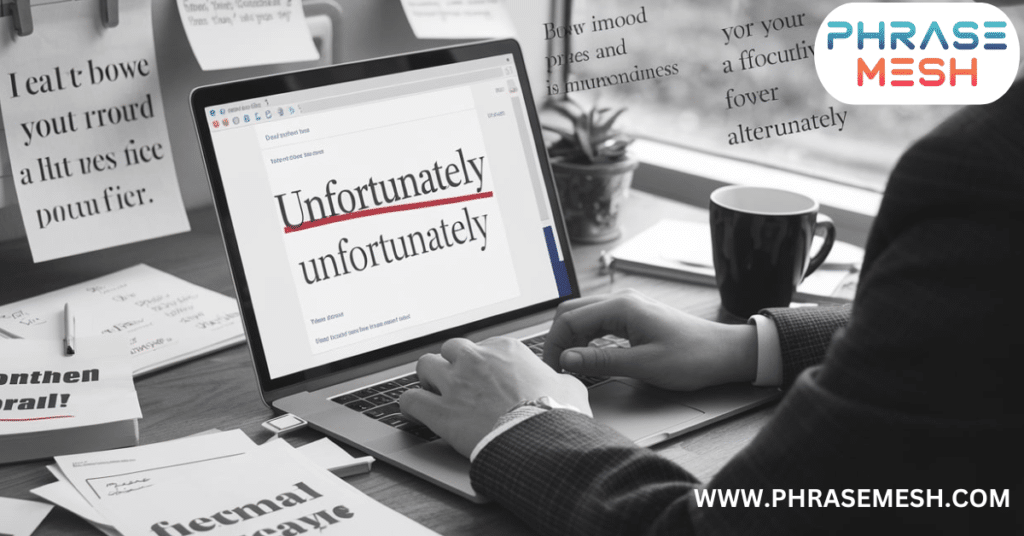In the world of business, delivering bad news is an inevitable part of communication. However, the way we convey this news can make all the difference in maintaining professional relationships and fostering a positive work environment.While “unfortunately” is a common go-to phrase, it can sometimes feel overused or impersonal.
This article explores ten professional email alternatives to help you master the art of diplomatic email language and enhance your workplace communication skills.
Urdu poetry is a mesmerizing form of literature. It captures emotions through rhythmic words. The origins of Urdu poetry are rich and complex. They span centuries and cultures. This section explores how Urdu poetry began.
Is It Professional to Say “Unfortunately”?
While “unfortunately” is widely accepted in business English vocabulary, its overuse can make your formal communication feel repetitive or impersonal. It’s generally professional when used sparingly, but exploring alternatives to negative words can enhance your email etiquette.
Varied phrasing demonstrates thoughtfulness and can soften the impact of disappointing news. The key is balance – occasional use of “unfortunately” is fine, but diversifying your language can elevate your professional writing skills.
What to Say Instead of “Unfortunately” in A Formal Email
- Regrettably
- I’m afraid
- We regret to inform you
- It is with disappointment that
- I wish
- I had better news
- Sadly
- To our regret
- We’re in the unfortunate position of having to
- It is with sincere apologies that
- We find ourselves unable to
- We must advise you that
- It is with regret that we inform you
- We’re sorry to say that I regret to say
- We’re disappointed to report
- Much to our dismay
- We find it necessary to inform you
- It is unfortunate that
- We’re in a position where we must
- To our disappointment
1. Regrettably

“Regrettably” is a powerful word in your business English vocabulary arsenal. It conveys a sense of genuine disappointment while maintaining a professional tone, making it perfect for formal regret statements.
Example:
Dear Ms. Thompson,
Regrettably, we’re unable to accommodate your request for an extended deadline on the Acme project. Our tight schedule and upcoming commitments prevent us from pushing back the completion date.
Best regards, James Wilson
2. I’m afraid
This phrase adds a personal touch to your formal communication phrases. It softens the blow of bad news and shows empathy, which is crucial in email tone management.
Example:
Hello Sarah,
I’m afraid I have some disappointing news regarding your proposal for the new marketing campaign. While the team appreciated your innovative ideas, we’ve decided to go in a different direction for this quarter.
Warm regards, Michael Chen
3. We regret to inform you
When you need to convey negative news in emails, this phrase strikes a balance between formality and empathy. It’s particularly useful in corporate correspondence wording.
Example:
Dear Mr. Patel,
We regret to inform you that your application for the Senior Analyst position has not been successful on this occasion. The competition was exceptionally strong, and we had to make some difficult decisions.
Sincerely, HR Department
4. It is with disappointment that
This phrase is perfect for expressing genuine regret in formal language in business emails. It’s especially useful when you need to convey a sense of shared disappointment.
Example:
Dear valued customer,
It is with disappointment that we must announce a delay in the launch of our new product line. Unforeseen supply chain issues have forced us to push back the release date by two months.
Thank you for your understanding, Emily Johnson, Product Manager
5. I wish I had better news

This phrase adds a personal touch to your professional disappointment phrases while maintaining appropriate boundaries. It’s an excellent choice for email etiquette expressions.
Example:
Hi Oliver,
I wish I had better news regarding your request for a budget increase for the marketing department. Unfortunately, due to recent company-wide cutbacks, we’re unable to approve any additional funding at this time.
Best, Sophia Lee
6. Sadly
“Sadly” is a concise yet empathetic way to introduce unwelcome news. It’s an effective tool in your arsenal of business writing synonyms.
Example:
Dear Dr. Nguyen,
Sadly, we cannot accept your proposal for the research grant this year. While your work is impressive, it falls outside the scope of our current funding priorities.
Regards, Mark Foster, Grant Coordinator
7. To our regret
This phrase is particularly useful in conveying bad news professionally when representing a group or organization. It’s a staple in diplomatic email language.
Example:
Dear Ms. Kozlov,
To our regret, we must decline your invitation to participate in the upcoming industry conference. Our team’s current commitments prevent us from attending this year.
Best regards, The Executive Team
8. We’re in the unfortunate position of having to
When you need to explain a complex situation leading to disappointing news, this phrase can be invaluable. It’s part of essential workplace communication skills.
Example:
Dear valued partners,
We’re in the unfortunate position of having to postpone our annual client appreciation event. Recent changes in local health regulations have made it impossible to proceed with our original plans.
Sincerely, Event Planning Committee
9. It is with sincere apologies that
This phrase conveys genuine remorse and is perfect for situations where your organization bears responsibility for the disappointing news. It’s a key element in professional writing alternatives.
Example:
Dear Mr. Rodriguez,
It is with sincere apologies that we inform you of a delay in processing your recent order. An unexpected system glitch has caused a backlog in our fulfillment center, and we’re working diligently to resolve the issue.
Yours truly, Customer Service Team
10. We find ourselves unable to

This phrase is an excellent choice for polite negative responses in formal settings. It conveys a sense of circumstances beyond your control while maintaining professionalism.
Example:
Dear Prof. Williams,
We find ourselves unable to accept your manuscript for publication at this time. While your research is compelling, it doesn’t align closely enough with our journal’s current focus.
Kind regards, Dr. Amelia Chang, Editor-in-Chief
11. We must advise you that
This phrase is particularly useful for conveying bad news professionally in a formal, business context. It sets a tone of authority and responsibility.
Example:
Dear Mr. Jacobson,
We must advise you that your application for a credit increase has been declined at this time. Our analysis indicates that your current financial situation does not meet our criteria for an increased credit limit.
Regards, Amanda Chen, Credit Department
12. It is with regret that we inform you
This formal regret statement is ideal for situations where you need to maintain a high level of professionalism while expressing genuine disappointment.
Example:
Dear Dr. Patel,
It is with regret that we inform you of the cancellation of this year’s International Medical Conference due to unforeseen global health concerns. We understand this news may disappoint many of our esteemed colleagues.
Sincerely, The Conference Organizing Committee
13. We’re sorry to say that
This phrase strikes a balance between formality and a more personal tone, making it a versatile choice for various business correspondence techniques.
Example:
Hello Sarah,
We’re sorry to say that we won’t be able to meet the proposed deadline for the Johnson project. Unexpected technical issues have arisen that require additional time to resolve.
Best, Tom Wilson
14. I regret to say
This professional disappointment phrase adds a personal touch while maintaining a formal tone, making it suitable for situations where you have a closer working relationship with the recipient.
Example:
Dear Lisa,
I regret to say that I won’t be able to attend the team-building retreat next month. A family commitment has come up that I cannot reschedule.
Warm regards, Michael Smith
15. We’re disappointed to report

This phrase conveys a sense of shared disappointment, which can be effective in formal language in business emails when delivering news that affects both parties.
Example:
Dear Valued Partner,
We’re disappointed to report that our joint venture proposal was not approved by the board. Despite our best efforts, they felt the project carried too much financial risk in the current economic climate.
Best regards, Jennifer Lee, Business Development Manager
16. Much to our dismay
This professional writing alternative expresses a stronger sense of disappointment and is suitable for situations where the negative news is particularly impactful.
Example:
Dear Mr. Tanaka,
Much to our dismay, we must inform you of a significant delay in the production of your custom order. A critical piece of machinery has malfunctioned, pushing back our entire manufacturing schedule.
Sincerely, Robert Green, Production Manager
17. We find it necessary to inform you
This phrase is particularly useful in corporate correspondence wording when you need to maintain a formal, somewhat detached tone while delivering unwelcome news.
Example: Dear Ms. Rodriguez,
We find it necessary to inform you that your proposal for the new marketing campaign has not been selected for implementation this quarter. While your ideas were innovative, they did not align closely with our current strategic objectives.
Regards, Marketing Strategy Team
18. It is unfortunate that
While this phrase does use a form of “unfortunate,” it can be a useful variation in your email etiquette expressions toolkit. It’s slightly less direct than “unfortunately,” which can soften the blow of bad news.
Example:
Hello Alex,
It is unfortunate that we cannot accommodate your request for additional funding for the research project. Current budget constraints prevent us from allocating any more resources at this time.
Best wishes, Dr. Emily Foster, Research Director
19. We’re in a position where we must
This phrase is excellent for email tone management when you need to convey that circumstances are forcing a particular action or decision.
Example:
Dear Valued Customer,
We’re in a position where we must increase our service rates starting next month. Rising operational costs and inflationary pressures have made this adjustment necessary to maintain our high standards of service.
Thank you for your understanding, Customer Relations Team
20. To our disappointment

This formal communication phrase expresses collective regret and is useful when representing an organization or team in delivering negative news.
Example:
Dear Professor Williams,
To our disappointment, we will not be able to include your research paper in this year’s publication. The unprecedented number of high-quality submissions has led to some difficult decisions in our selection process.
Kind regards, Dr. Sarah Johnson, Chief Editor
The Power of Language in Professional Communication
The importance of choosing the right words in business communication cannot be overstated. Your choice of language can significantly impact how your message is received and interpreted. When it comes to delivering bad news or rejecting proposals, the words you use can make the difference between maintaining a positive professional relationship and potentially damaging it.
Using alternatives to “unfortunately” demonstrates your command of business English vocabulary and shows consideration for the recipient’s feelings. It’s a subtle yet powerful way to practice email tone management and maintain a professional demeanor even in difficult situations.
Moreover, these professional email alternatives can help you avoid sounding repetitive or insincere. By varying your language, you show that you’ve put thought into your communication, which can be appreciated by the recipient, even if the news itself is disappointing.
Adapting to Different Scenarios
It’s important to note that the appropriate phrase to use may vary depending on the specific situation and your relationship with the recipient. For instance, “I’m afraid” might be more suitable for a colleague you work with closely, while “We regret to inform you” could be better for a more formal business relationship.
Consider the following scenarios:
- Rejecting a job applicant: Use more formal phrases like “We regret to inform you” or “Unfortunately, we are unable to offer you the position.”
- Declining a meeting request: Opt for something like “I’m afraid I won’t be able to attend” or “Regrettably, I have a conflict.”
- Informing a client of a delay: Try “We’re in the unfortunate position of having to delay the project” or “It is with sincere apologies that we must inform you of a delay.”
- Turning down a proposal: Use “Sadly, we cannot move forward with your proposal” or “We find ourselves unable to accept your proposal at this time.”
Enhancing Your Professional Writing Skills
Mastering these alternatives to “unfortunately” is just one aspect of developing strong professional writing skills. To further improve your formal email writing, consider the following tips:
- Be mindful of your tone: Ensure your email strikes the right balance between professionalism and empathy.
- Use active voice: This makes your writing more direct and engaging.
- Proofread carefully: Typos and grammatical errors can undermine your professionalism.
- Keep it concise: Respect your recipient’s time by getting to the point efficiently.
- Use appropriate salutations and closings: These set the tone for your email and leave a lasting impression.
Conclusion
In the realm of professional communication, the ability to deliver negative news like wise saying “Unfortunately” tactfully is a valuable skill. By expanding your repertoire of formal communication phrases and mastering the art of conveying bad news professionally, you’ll enhance your overall workplace communication skills.
Remember, the goal of using these professional email alternatives is not just to soften bad news, but to maintain positive relationships even when delivering disappointing information. Your choice of words can make a significant difference in how your message is received and can help preserve goodwill in professional relationships.
As you incorporate these alternatives into your business correspondence, you’ll find yourself better equipped to handle a wide range of challenging communication scenarios. With practice, you’ll develop a natural flair for diplomatic email language, enhancing your professional image and fostering positive interactions in your business communications.





